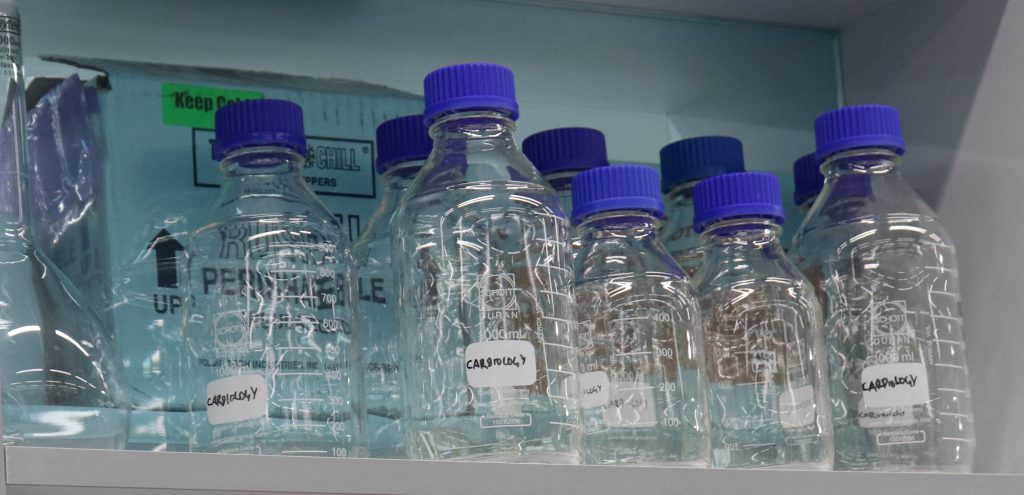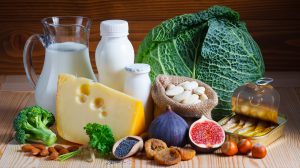- Posted: 19 December 2019
- Tagged: Research Updates
Does dairy increase the risk of prostate cancer?
As we settle in to the New Year, PCRC Research Communications Intern Kath investigates whether we should all be having a ‘Veganuary’.
A shortened version of this story first appeared in the Winter 2019/20 issue of our newsletter, Lifeline.
New Year, new you?
For many people, the New Year symbolises new beginnings: a chance to wipe the slate clean and start afresh with resolutions and plans for a healthier lifestyle. Recent years have seen more of us are becoming aware of the health impacts that diet can have. Veganuary, a campaign encouraging more of us to cut meat and dairy from our diets in January, has become very popular, with 46% of participants doing so for health reasons. Unfortunately as awareness has risen, the advice around health and diet has become increasingly confusing. Dairy, in particular, is often claimed to be both good and bad for our health! A recent study has even claimed there may be a link between dairy consumption and prostate cancer risk. So, should we all be having a Veganuary?
The Study
You may have seen recent headlines claiming that dairy food leads to a higher risk of prostate cancer. The Mirror reported “Eating cheese, butter and yoghurt ‘increases prostate cancer risk’”, The Daily Mail proclaimed that “Consuming lots of milk, cheese and butter may raise the risk of prostate cancer by up to 76%”, and The Express warned “Prostate cancer warning: Eating this popular food may increase your risk”. These headlines were based on a study from the Mayo Clinic, where researchers conducted a review of 47 studies investigating diet and prostate cancer. They found that there may be a link between an individual’s dairy consumption and their prostate cancer risk. Plant-based or vegan diets were found to be associated with a slightly lower risk whereas higher dairy consumption was associated with a higher risk. However, before we all cut dairy from our diets, there are some important factors to consider.


Dairy is healthy?
Dairy is known to have many health benefits, it has been shown to be packed full of vital nutrients like calcium and protein. In particular, the calcium found in dairy is very important for bone health. Without these essential nutrients the risk of osteoporosis, a condition which leads to weak and fragile bones, may increase. Studies have shown that dairy consumption can lead to stronger bones and a reduced risk of fractures. The British Dietetic Association (BDA) recommends that those on a non-dairy diet ensure they get enough calcium from other sources such as dried fruit, nuts and leafy green vegetables in order to reduce their risk of bone fractures.
Inconsistent and confusing
Previous studies on diet and prostate cancer have been inconsistent. Most do suggest there may be a link with dairy and an increased risk of prostate cancer but some have found no link. Others have even associated dairy with a reduced risk! The researchers in this study only concluded that there may be a link between dairy. We would need more studies to confirm whether there is a definite link. Additionally, studies on dairy and prostate cancer risk are particularly difficult as researchers often have to estimate the dairy intake of participants so some results may not be accurate.
What does a ‘link’ mean?
Finally, finding a link does not necessarily mean that it is dairy consumption which causes or leads to prostate cancer. There may be other important factors at play which we don’t know about and the link to dairy consumption may just be a coincidence. For example, it may be that individuals with high dairy intake are more likely to smoke or less likely to exercise. On the other hand, individuals who follow a plant-based or vegan diet for health reasons may be more health-conscious in general, leading to the lower risk.
So, do we need to change our diets?
The nutrients found in dairy are incredibly important for health and there is currently not enough evidence to link dairy consumption with an increased risk of prostate cancer. We would need further, more detailed studies to understand whether there is a link between dairy and prostate cancer and what that link may mean.
Every individual’s health depends on a number of factors so you should always consult your doctor when considering making big changes to your diet. If you have been diagnosed with cancer, it is particularly important that you receive the right information about your diet. Oncology specialist dietitians can provide you with expert advice on nutrition at any stage of your treatment.
